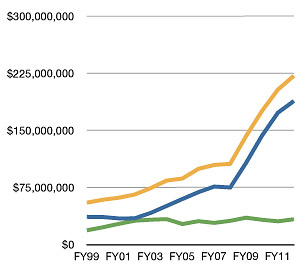Cornell affirms commitment to need-blind admissions and robust need-based aid

Cornell University has restated its long-standing commitment to need-blind admissions and robust financial aid, and it is spending more on need-based financial aid and benefiting more of its students than ever in its history. Financial aid is one of the university's top priorities, and Cornell now spends at least $225 million, every year, on undergraduate financial aid. With the significant enhancements (see Figure 1) of undergraduate financial aid programs in 2008 and 2009, Cornell's undergraduate financial aid expenditures have increased at an average annual pace over four times greater than undergraduate tuition.
While the cost of an undergraduate education in Cornell's endowed colleges has increased an average of 4.6 percent, yearly, since 2008, Cornell's expenditures on financial aid have grown on average nearly 20 percent, annually, during the same period. The university's need-based financial aid grants now benefit more than 50 percent of the undergraduate student body. More than 80 percent of the need-based financial aid awarded to Cornell undergraduates is provided through university funds.
Adjustments to the financial aid programs will take effect starting with undergraduate students matriculating in the fall of 2013. There will be no change to the financial aid programs for students with family incomes below $60,000. These students will continue to have no loan obligation in their financial aid packages; need-based aid will be provided through Cornell grants and federal, state, and other external awards. Students with family incomes between $60,000 to $75,000 will receive financial aid packages that include need-based loans capped at $2,500 per year. For families with incomes ranging from $75,000 to $120,000, need-based loans in the financial aid package will be capped at $5,000 annually. (See chart at end of story.) Expectation for academic year earnings from work, which have not been raised for two decades, will increase from $2,000 to $2,500 per year

"We are dedicated to our historic priority of access to the benefits of a Cornell education for the most deserving students, regardless of their ability to pay, through need-blind admissions and robust financial aid," said Provost Kent Fuchs. "Our entire academic community benefits from our ability to enroll a talented and diverse student body, while also ensuring that their choices after graduation are not constrained by debt. In order to sustain that promise into the future -- and meet our other top priorities at the same time -- we are making adjustments in our financial aid programs that will ensure that Cornell's commitment to need-blind admissions and need-based aid is not only durable but also enduring."
From 2007 to 2011, the university made great strides in reducing the percentage of students who borrow during the academic year, from 43 percent to 34 percent (see Figure 2). In addition, the average cumulative loan debt at graduation among those who borrowed decreased from $23,936 for 2007 graduates to $19,180 for 2011 graduates. Financial aid and scholarships are also a heightened priority in the Cornell campaign, with a new goal of $350 million.
"Our earlier decision to substantially increase need-based financial aid has, since 2008-09, reduced the net cost of attendance for Cornell students with demonstrated financial need in all income groups. And, even with the adjustments to the program the net attendance costs for many of our aided students will remain lower than in 2007-2008, reflecting our commitment to provide access for all deserving, qualified students," said Vice Provost Barbara Knuth. "In fact, with median U.S. household annual income slightly under $55,000, about half of U.S. families would qualify for Cornell grant aid replacing all loans, and little to no parent contribution in their financial aid package if their child was admitted to Cornell."
Said Lee Melvin, associate vice provost for enrollment: "Our commitment to need-blind admission and need-based financial aid continues to assure that Cornell's financial aid programs are distributed most equitably. As we have always said, if you are admitted to Cornell, we are committed to working with you to make a Cornell education affordable."
For more information on financial aid at Cornell, visit: www.finaid.cornell.edu.

Media Contact
Get Cornell news delivered right to your inbox.
Subscribe